JDC ANNUAL REPORT
2022
The JDC was established in late 2019 to help change the collective approach to forced displacement to one that is bigger, broader, and that lasts longer, matching the scale of the challenge. This requires a different model, one that recognizes protracted displacement as part of an interconnected web of socioeconomic issues, a model that is driven by evidence-informed decisions that are based on robust data. As we look back on the past four years, an observable improvement has occurred in this approach.
Since the creation of the JDC, UNHCR has strengthened its own role as a data-driven organization through its Data Transformation Strategy, and the World Bank has extended some of its surveys and assessments to include forcibly displaced populations. Last December, the High Commissioner’s Dialogue on Protection Challenges focused on the theme of development cooperation, highlighting the JDC’s value as a curator and source of high-quality socioeconomic data and evidence.
That the World Development Report 2023 focuses on migrants and refugees is further testament that the challenge of forced displacement is at the core of the global development agenda, including the data challenge. Ahead of the 2023 Global Refugee Forum, this report is important recognition of the development community’s commitment to leave no one behind, and further evidence of the changing collective response of humanitarian and development partners.
Beyond the direct support to the World Bank and UNHCR, the JDC has worked hard, so that refugees, internally displaced and stateless people are included in national statistics. Censuses and household surveys that include the forcibly displaced produce data that can help governments and humanitarian and development partners create policy and programs that can profoundly affect the lives of these people.
At the end of 2023, when the JDC concludes its first phase, the sum of our efforts will have increased the quality, quantity and accessibility of socioeconomic data on those forced to flee, and their hosts. Although this creates a clearer picture of the situation of forced displacement, our improved understanding also makes the gaps in the data even more apparent; a reminder that there is still work to be done.

Soukeyna Kane
Director,
Fragility, Conflict and Violence Group
World Bank

Director,
External Relations
United Nations Refugee Agency (UNHCR)
2022 In Review
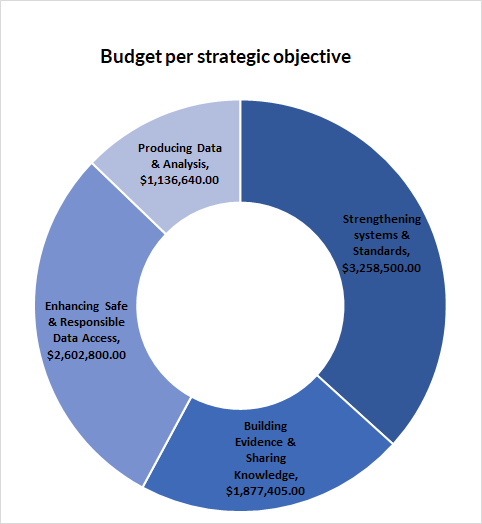
i) strengthening statistical standards and systems;
ii) producing data and analysis;
iii) enhancing responsible data access, and
iv) building evidence and sharing knowledge.
This report reflects on the highlights of, and lessons learned in, 2022. Over this year, several key data collection and analytical efforts that the JDC has invested in since its inception came to fruition.
When the COVID-19 pandemic swept across the world in 2020, the JDC was just beginning its activities in earnest. Today, three years later, we have delivered key insights from a series of in-person, high-frequency phone surveys that were conducted in Bangladesh, Burkina Faso, Chad, Colombia, Costa Rica, Kenya, Mexico, Peru and Yemen.
With support from the JDC, the UNHCR Forced Displacement Survey (FDS) – a ‘first of its kind’ designed to measure the socioeconomic status of forcibly displaced people within countries and cross-nationally – is being piloted in Cameroon, Pakistan and South Sudan.
More systemically, the JDC has supported the Expert Group on Refugee, IDP and Statelessness Statistics (EGRISS) to develop and institutionalize international standards that include forcibly displaced and stateless people in national statistical systems. A cornerstone achievement of EGRISS’ work was the development of statistical standards on statelessness. These standards will help to shed light on the situation of stateless people around the world. The JDC has also engaged with the Inter-Agency and Expert Group on SDG indicators (IAEG-SDGs) to ensure that forced displacement is visible in key SDG indicators.
The end of 2023 will mark the end of the JDC’s first mandate and the results of the past few years are currently being measured against the objectives that were set out in the original terms of reference and strategy. The main purpose of the JDC’s work has been to produce data and analysis and funding has been channelled accordingly. Nearly 70 percent of the JDC’s resources support 32 activities that aim to achieve this (see below).
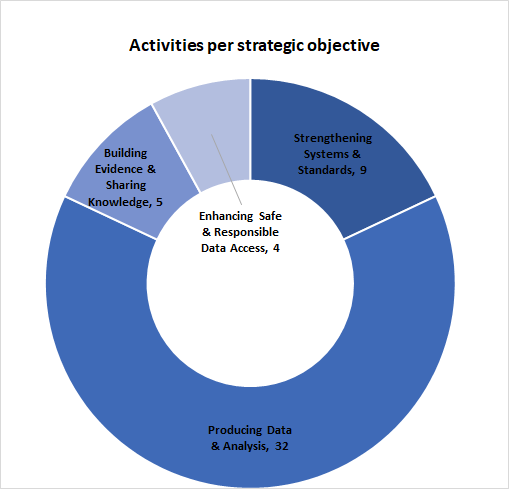
However, major gaps remain in fulfilling this ambition and there is a growing need to link socioeconomic research and analysis with operations. The JDC will continue to attempt to fill that gaps in data on forced displacement and, in addition, will aim to maximize the operational relevance of existing data and analysis by proactively identifying the needs of policymakers, development partners, and other key stakeholders.
A catalyst that could transform the data landscape, and one that the JDC has focused on, is innovation. At the end of 2022, the JDC brought together humanitarian and development experts to ask them how innovation could be applied to data on forced displacement. One example identified was the application of an algorithm that identifies key data and evidence gaps on forcibly displaced people. The JDC has also developed a knowledge agenda which aims to provide new tools to fill these gaps and to strengthen the link between researchers and practitioners.
Strengthening Systems & Standards
Refugee Statistics
IDP Statistics
EGRISS was also active in identifying and resolving gaps in the statistical frameworks set out in IRRS and IRIS. For instance, there still is no international consensus on which indicators and metrics should be used to measure the cessation of a person’s IDP status. Together with other EGRISS members, the JDC produced an in-depth methodological paper, entitled “Towards a harmonized statistical measure for exits from the stock of internally displaced people”, which tackles this question. This work is essential to the UN Secretary-General’s Action Agenda on Internal Displacement which focuses on solutions to internal displacement in 16 countries. The JDC has engaged with the Special Advisor to the Secretary General on Internal Displacement and his team, advising on the use of the IRIS and socioeconomic data for programming and policy decisions.
Statelessness Statistics
Statistical Standards
Innovative Tools & Data Science
The JDC convened a workshop on November 30 and December 1, 2022, which explored opportunities for and barriers to applying innovative tools and data science to overcome the challenges that forced displacement will present over the next five years. The hybrid sessions brought together 70 specialists from 20 international organizations, governments, think tanks and academia, to explore ideas and collectively brainstorm. The workshop identified immediate opportunities for impactful work in three broad areas:
Enhancement of household survey sampling approaches
There is potential to adapt the algorithmic identification and grouping of households for household survey sampling approaches in forced displacement settings. UNHCR’s new Forced Displacement Survey series is an opportunity to test and optimize this.
Using open data to complement survey-based estimation
Food security was identified as a priority, based on need and feasibility. There is an opportunity to adapt the current estimation frameworks to forced displacement settings to test their operational relevance – for instance, by using open data, including satellite imagery, combined with household survey data, to update socioeconomic indicator estimates between face-to-face survey waves.
Automated discovery and use of forced displacement data
The detection of unstructured text relevant to forced displacement offers promising possibilities, and there are opportunities to apply this tool to non-academic literature (e.g., reports and white papers) as well as to other microdata platforms to understand how socioeconomic microdata informs operations and policy.
DRC has not had a census since 1984.
Hence, most forcibly displaced people – refugees and internally displaced – are invisible, excluded by a dated sampling frame.
The JDC has supported the development of an innovative sampling tool to survey the socioeconomic status of IDPs, returnees, and host communities in the Grand Kasaï, DRC. This area has experienced multiple displacements and includes returnees and IDPs.
The tool has been applied to the very context where sampling frames are absent or outdated to ensure that forcibly displaced people are captured in the data. The quality of sampling frames in many fragile contexts that have a high incidence of forcibly displaced people can be questionable, as they are not necessarily current, comprehensive and sufficiently informative of the target population. The application is an open-source tool that provides data collecting teams with user-friendly, advanced sampling approaches for forcibly displaced and host populations requiring minimal programming skills.
Producing Data & Analysis
Over half (58%) of the JDC’s data production and analysis is now implemented through NSOs.
Stateless people are often not properly identified in population censuses, perpetuating the lack of socioeconomic data on these people and further marginalizing them by hindering their access to social safety nets, public services and employment opportunities. Since its inception, the JDC has advocated for the statistical inclusion of the stateless people and 2022 marked the inclusion of stateless people in three population censuses.
In 2022, the JDC also produced a series of analytical briefs and reports using microdata to monitor and assess the socioeconomic profile of forcibly displaced people during the COVID-19 pandemic. These analytical pieces will help the governments and development partners better understand and respond to the specific needs and challenges of forcibly displaced people at a time of significant uncertainty precipitated by the COVID-19 pandemic and perpetuated by the war in Ukraine.
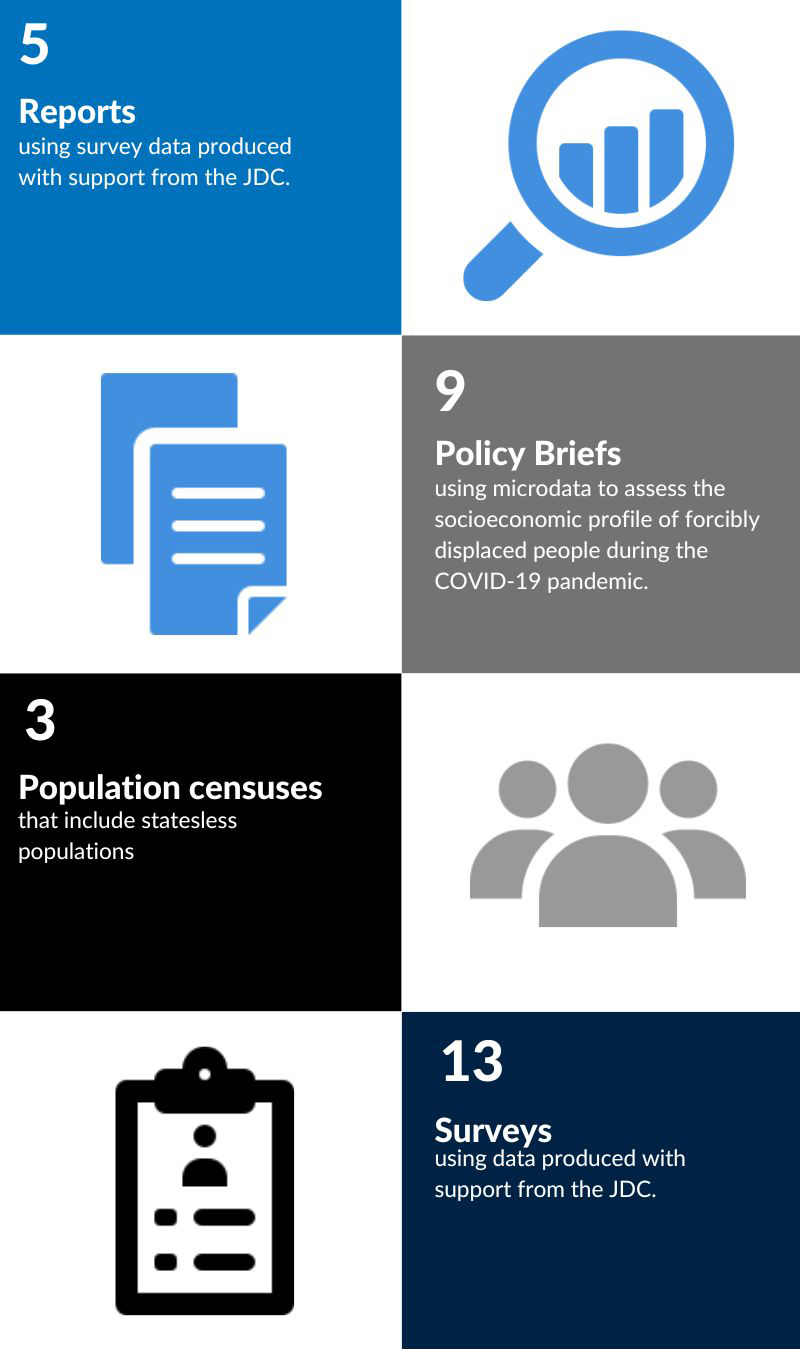
Enhancing Responsible Data Access
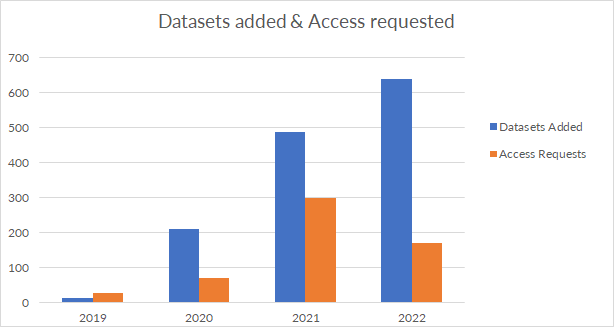
353 New Datasets in the Raw Internal Data Library
169 Curated and Cleaned Datasets in the UNHCR Microdata Library
6 Capacity Building Activities
Building Evidence & Sharing Knowledge
Papers published on Forced Displacement in Economics
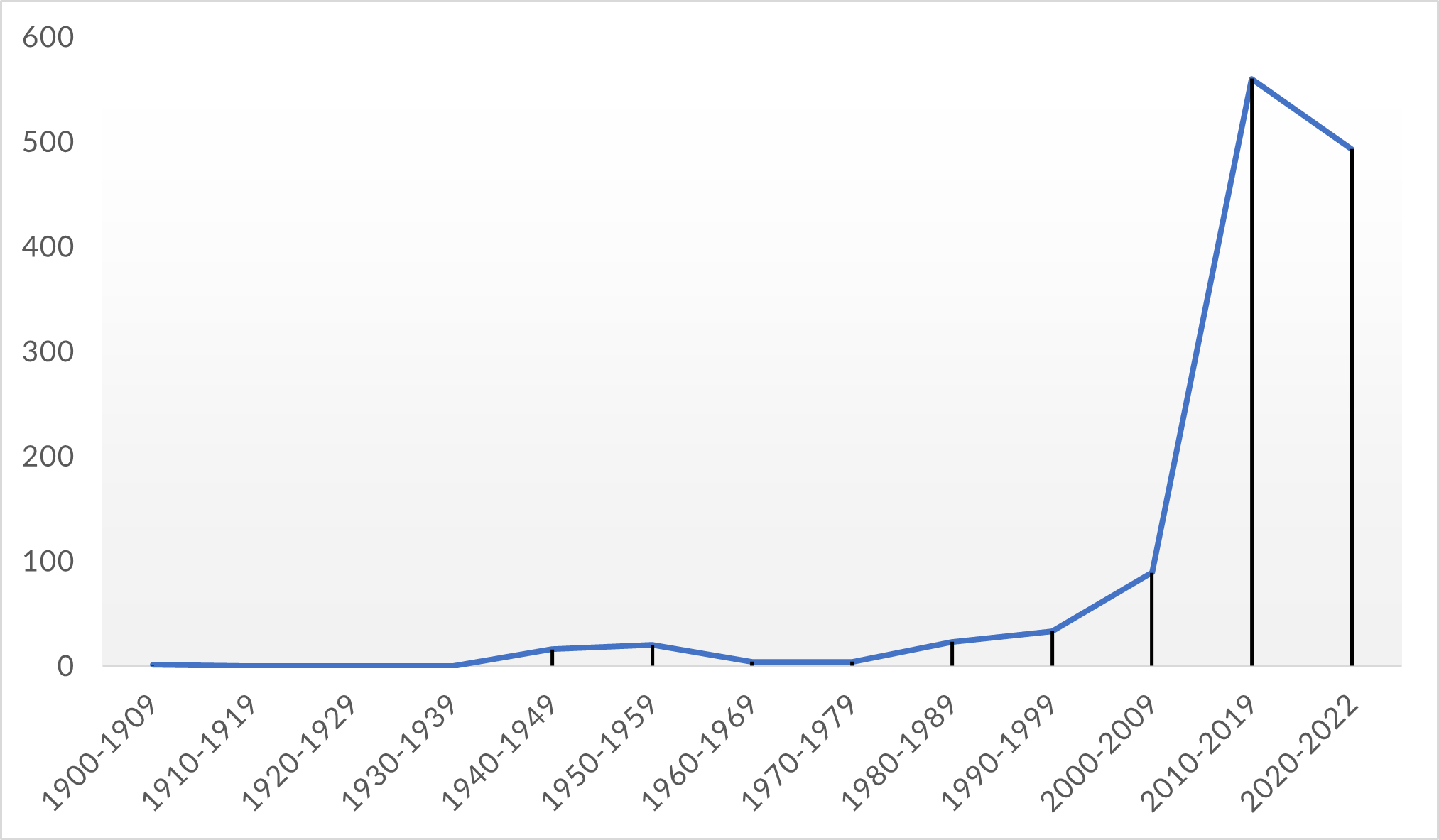
Until recently, quantitative literature on forced displacement was limited. The majority of academic research in this area was confined to academic disciplines such as legal studies or anthropology.
The increase in research accelerated in 2020 as data on forcibly displaced people became increasingly available, particularly in geographic areas which research has often neglected, and as a result of the many datasets now accessible through the World Bank and UNHCR MDLs.
As more research on forced displacement becomes available, so too does the need for dissemination so that it can be used outside academia, bridging the gap between evidence and policymaking.
JDC Fellows
The Fellowship program allows young researchers collaborate with JDC team members and develop their research agenda. It supports young scholars and professionals from displaced or host communities in middle- and low-income countriesto work on topics related to forced displacement.
As an energy specialist, I am passionate about using data and evidence to influence decision-making to help achieve the seventh sustainable development goal (affordable and clean energy). The fellowship offered me the opportunity to interact with key stakeholders in the humanitarian energy system and devise new approaches to solving complex energy issues. I also gained investigation skills and learnt how to devise policy recommendations that improve the well-being of internally displaced people. The seminars and workshops offered by the JDC exposed me to broad areas of knowledge and enabled me to establish a sound understanding of forced displacement. My experience with the JDC was rewarding and I am confident that it will be instrumental in shaping my career path.
2nd Research Conference on Forced Displacement
Literature Review Database
JDC Digest
The Digest on Housing and Shelter was among the documents that informed “Measuring the Impact of Hosting, Protecting, and Assisting Refugees”: a meeting led by UNHCR of member states and other stakeholders where the World Bank and the JDC offered technical inputs.
The Digests have proven to be a popular product among our stakeholders. Taking into account that some Digests have only been out for a limited time, while others were published more than two years ago, the results indicate that the appetite for these publications is not vanishing over time. The increasing trend in monthly downloads suggests that the Digests are becoming more popular over time.
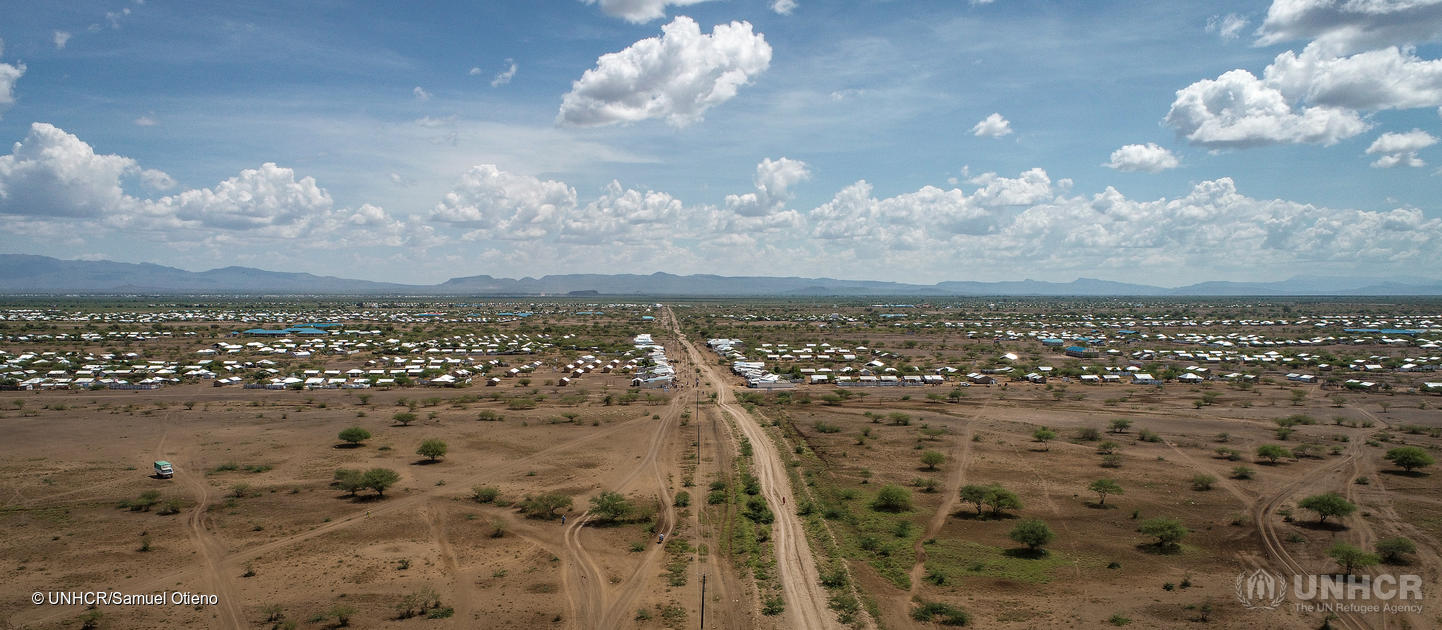
Lessons Learned
Timely implementation entails commitment and engagement.
Several activities have suffered significant delays due to changes in political situations. The Socioeconomic Survey of Refugees in Ethiopia was delayed due to increasing security concerns as well as restructuring within the Government of Ethiopia. Most major data and analytical activities in Burundi – including the planned refugee survey work and finalizing and disseminating the report on the WB-UNHCR Socioeconomic Survey – stalled due to changes in the political environment. Staff turnover at the JDC’s parent organizations – UNHCR and the World Bank – also disrupted and delayed the implementation of several activities. Continued commitment and engagement from the government and the JDC’s parent organizations helps to ensure the timely and smooth implementation of data collection and analytical activities.
Working with National Statistical Offices and building their capacity is fundamental to delivering data that is sustainable, scalable, comparable, and which governments trust.
In 2022, the JDC continued to increase the share of data that is produced with and through NSOs, but this part of our overall work program could be greater. While this kind of data production requires a focus on investment in the national capacity, and can be slower than ad-hoc activities, it comes with a range of advantages. First, the inclusion of forcibly displaced people is more sustainable and scalable, if it is carried out with NSOs – something we have seen in Chad and Uganda. Second, when forcibly displaced people are included in national surveys, it results in data that is fully comparable to national statistics. This is something that data users of the national poverty survey in Chad have noted. Further, the trust that government authorities have in this data is often higher than that which they have in the surveys conducted by international agencies.
Over the past year, the JDC has made an effort to build on its current relationships with NSOs at events such as the EGRISS all-members meeting, the annual meeting of the Expert Group on SDG indicators, the International Forum on Migration Statistics and the annual meeting of the UN Statistical Commission. “Statistical inclusion” became core to the JDC’s work. As part of that effort, the JDC initiated an “innovation lab” together with EGRISS and UNHCR aimed at encouraging governments to formally pledge, under the Global Compact on Refugees, to include forcibly displaced people in their national statistics. Regardless, more needs to be done to consolidate the JDC’s place as a catalyst and partner within the larger effort.
More work needs to be done to put EGRISS international recommendations into action.
A lack of consistency in survey questionnaires, for instance, has made the harmonization of COVID-19 high frequency surveys difficult. Despite significant efforts to standardize the questionnaires of the phone surveys, many of them had to be adjusted and tailored for specific countries. As a result, the cross-national harmonization of COVID-19 high frequency surveys has taken much longer than initially anticipated. It is critical that data collection complies with EGRISS international recommendations so that the quality of data is improved, including that which is supported by the JDC. The CAR 2021 Harmonized Household Living Conditions survey is a good example of how EGRISS international recommendations were integrated into a questionnaire. The JDC also provided technical support to implement the international recommendations in Iraq and Somalia at the request of those governments.
Data does not automatically transform into operations and policy without effective engagement and dissemination.
While 2022 has seen the proliferation of new micro datasets on forcibly displaced people in the UNHCR and World Bank microdata libraries, ensuring that it is available and useful to practitioners and policymaker remains a challenge. It is critical that the JDC to continue its effort to make data and analysis “digestible” for the users, by having it presented in a concise and accessible manner. As one step to make this happen, the JDC will continue to drawing an arc from its initial work to the end use, ensuring that the design of activities is operationally relevant and dissemination is at the core of any new work.
There is still significant potential to develop and use innovative tools and methods to improve the quality and production of data on forced displacement.
The JDC has funded the development and enhancement of innovative tools and methods that improve the quality of microdata on forced displacement. 2022 saw these applied in the Impact Evaluation of an Integrated Safety Net for Refugees and Host Communities in the Republic of Congo (KoBo Toolbox); the Socioeconomic Survey in the Grand Kasaï, DRC (gridded sampling tool); the assessment and improvement of geospatial data in displacement settings in CAR, Chad and DRC (geospatial data) and the identification of key data gaps in the existing micro datasets on forcibly displaced people (automated text analysis) and others. The JDC will need to continue its investment in innovation and data science to enhance and improve data production in displacement settings.
Focus needs to be placed on scale and sustainability.
As many of the activities committed under the JDC’s 2021-2023 Strategy approach their completion, the focus needs to be on sustainability. It is important to ensure that JDC funded activities are “owned” by NSOs and the relevant units and departments within the parent organizations. In this respect, it is promising to see that UNHCR has now established the GDS, which takes ownership of the curation and processing of microdata. A small number of host country statistical offices have also begun to expand their national Multiple Indicator Cluster Surveys, Demographic and Health Surveys, labour force surveys or integrated poverty surveys to also include refugees and IDPs. This will provide governments with invaluable data and insights with which to support forcibly displaced people and institutionalize the work of the JDC.
MOVING FORWARD
The JDC would like to thank the individuals, organizations, governments, and NSOs who collaborated with and supported the organization in achieving its objectives, particularly, the guidance provided by our Management Committee and Strategic Advisory Council. The JDC would also like to extend its appreciation to its partners for their generous financial contributions in 2022: the Government of Denmark, represented by the Danish Ministry of Foreign Affairs; the European Union, represented by the Directorate-General for International Partnerships at the European Commission; and the United States Government, represented by the U.S. Bureau of Population, Refugees, and Migration. The JDC also benefits from support by the IKEA and Hilton Foundations.






